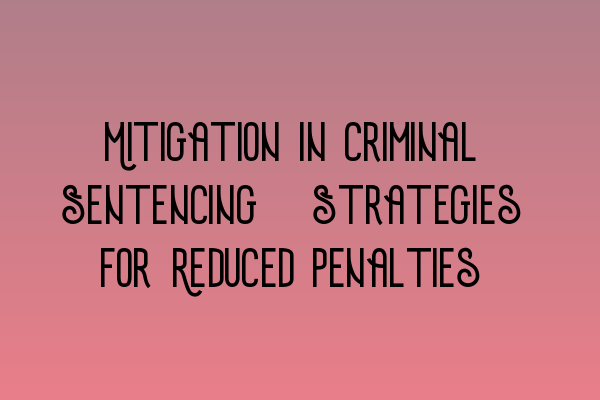Mitigation in Criminal Sentencing: Strategies for Reduced Penalties
When facing criminal charges, it’s crucial to understand the concept of mitigation. Mitigation refers to the process of presenting evidence and arguments to the court in order to secure reduced penalties for the accused. In this article, we will explore effective strategies for achieving reduced sentences through mitigation.
The Importance of Mitigation
In criminal cases, the court takes into consideration various factors when deciding on the appropriate penalty. These factors may include the nature and severity of the offense, the defendant’s personal circumstances, and any mitigating factors presented. Mitigation plays a crucial role in convincing the court to impose a more lenient sentence.
One key strategy for effective mitigation is to demonstrate genuine remorse for the actions committed. Expressing remorse shows the court that the defendant understands the impact of their actions and is genuinely sorry for the harm caused. It is important to present this remorse sincerely and in an authentic manner.
Another effective strategy is to provide evidence of rehabilitation efforts. This could include attending counseling or therapy, participating in educational programs, or engaging in community service. By showcasing these efforts, the defendant can demonstrate their commitment to personal growth and positive change.
The Role of Legal Representation
Legal representation is crucial in navigating the complexities of the criminal justice system and presenting a strong case for mitigation. A skilled solicitor can help gather evidence, interview witnesses, and construct compelling arguments on behalf of the defendant.
It is advisable to engage an experienced criminal defense solicitor who specializes in mitigation. They will be well-versed in the relevant laws and sentencing guidelines, allowing them to develop a personalized strategy for achieving reduced penalties.
In addition to legal representation, attending workshops and seminars on criminal practice can further enhance your knowledge and understanding of mitigation strategies. These educational opportunities provide valuable insights into the latest developments in criminal law and can help you stay updated on best practices.
Expertise in Criminal Law
By staying informed and prepared, you can maximize your chances of successful mitigation. Regularly checking for updates in UK criminal laws ensures that you are aware of any changes that may impact your case.
Another effective way to enhance your SQE criminal law study is to actively participate in a study group. Collaborating with peers who share similar goals can provide a supportive and enriching learning environment. Learn more about enhancing your SQE criminal law study group experience.
Understanding the Criminal Justice System
When dealing with criminal charges, it’s essential to have a deep understanding of the criminal justice system. One crucial aspect is a comprehensive knowledge of the rules governing criminal evidence. Read our detailed analysis on decoding criminal evidence rules to strengthen your understanding.
Additionally, fraud and financial crimes are prevalent in the UK criminal justice system. To gain a deeper understanding of these offenses, read our comprehensive article on fraud and financial crimes in the UK.
Conclusion
In summary, mitigation plays a crucial role in achieving reduced penalties in criminal sentencing. By demonstrating genuine remorse, showcasing rehabilitation efforts, and seeking legal representation, you can significantly increase your chances of a favorable outcome. Stay informed, continuously learn, and actively participate in your defense to enhance your mitigation strategy.
